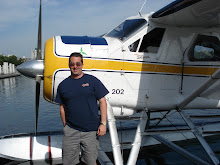S/Ldr William ' Bill ' A. Waterton GM AFC 1916-2006
 Bill Waterton(right) discussing the flight with Prince Bernard of the Netherlands
Bill Waterton(right) discussing the flight with Prince Bernard of the Netherlands
He gained much of his extensive flying experience with the RAF's Air Fighting development unit. This was based at Wittering in Lincolnshire and had an important role in devising tactics for fighter command based on the actual performance of aircraft rather than what the manufactures claimed they were able to achieve. In 1946 he was posted to the Royal Air Force's High Speed Flight, a group that was determined to keep the world's speed record in Britain. On September 7, despite an attempt by Royal Aero Club officials to disqualify him because he was Canadian, he flew his Meteor EE550 at an average speed of 614mph. Group Capt Donaldson increased the world air speed record to 616mph. He was awarded a second Air Force Cross following the success of the team but left the RAF in October 1946 to join Gloster as a test pilot on the princely salary of £1,000 per year.
He became the chief test pilot for Gloster in April 1947 and was involved in all the experimental flying with the later models of the Meteor and in training of pilots for other air forces beginning with Argentina, the first export customer for the Meteor. In December 1949 he was sent to Canada on loan to Avro Canada to test fly the prototype Avro CF-100. The first fight of the CF-100 took place on 19th January 1950 with Bill Waterton at the controls. He remained on loan with Avro Canada until February 1951. Following his return he continued to be the primary experimental test pilot for Gloster including the first flight of the Javelin (WD804) in which he suffered his most serious crash following the loss of the Ailerons due to aerodynamic flutter. He was awarded the George Medal for his actions in returning to the burning wreckage to recover flight data, which would prove useful in resolving the cause of the crash, therefore saving thousands of pounds.
Bill Waterton resigned from Gloster's at the end of May 1954, He left after serious disagreements with the management of Gloster which are detailed in his comprehensive book "The Quick and the dead".
After leaving Gloster, Bill Waterton returned to Canada and became an aviation journalist.






<< Home